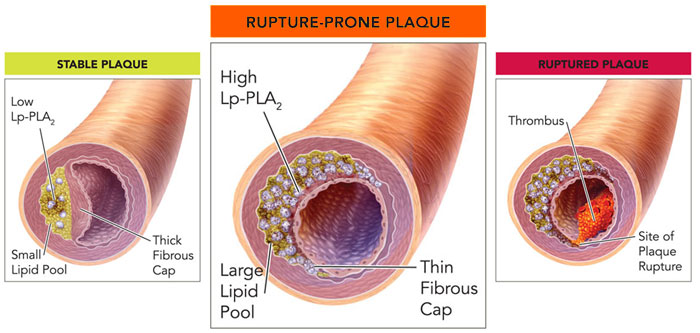May is National Stroke Awareness Month
Stroke is the fourth* leading cause of death in the U.S. and is the leading cause of long term disability, affecting nearly 800,000 Americans annually. Every 40 seconds, someone in the U.S. has a stroke. Yet, despite being a leading cause of death and adult disability, fewer than one in five people in the U.S. can recognize a symptom of a stroke.
Know the Signs!
Many warning signs that indicate a person is having stroke, too often, go unnoticed. Recognizing stroke symptoms can be easy if you remember to think F-A-S-T!
F=Face. Ask the person to smile. Does one side of their face drop?
A=Arms. Ask the person to raise both their arms. does one arm drift downward?
S=Speech. Ask the person to repeat a simple phrase. Does their speech sound slurred or strange?
T=Time. If you observe any of these signs, call 9-1-1 immediately.
Most strokes and 75% of heart attacks are caused by plaque rupture and thrombosis, not stenosis. The PLAC® Test is the only blood test cleared by the FDA to aid in predicting risk for both ischemic stroke associated with atherosclerosis and coronary heart disease. Early detection and more aggressive treatment can help prevent these cardiovascular events.

Individuals who have an elevated PLAC Test score and systolic blood pressure greater than 130 mmHg are nearly seven times more likely to have a stroke.**
The PLAC Test for Lp-PLA2 is a vascular-specific inflammatory marker and simple blood test that can help you identify which of your patients may actually be at higher risk for stroke or heart attack and can benefit from more aggressive treatment to a lower LDLc goal. No fasting is required.
For more information on how you can use the PLAC Test to help predict your patients’ stroke risk, order it with the VAP Lipid Panel from Atherotech Diagnostics Lab, or call 1-866-VAP-TEST.
* National Vital Statistics Report, December 9, 2010. (Includes final data for 2007)
** Ballantyne CM, et al. Lipoprotein-associated phospholipase A2, high-sensitivity C-reactive protein, and risk for incident ischemic stroke in middle-aged men and women in the atherosclerosis risk in communities (ARIC) study. Arch Intern Med 2005;165:2479-84.




